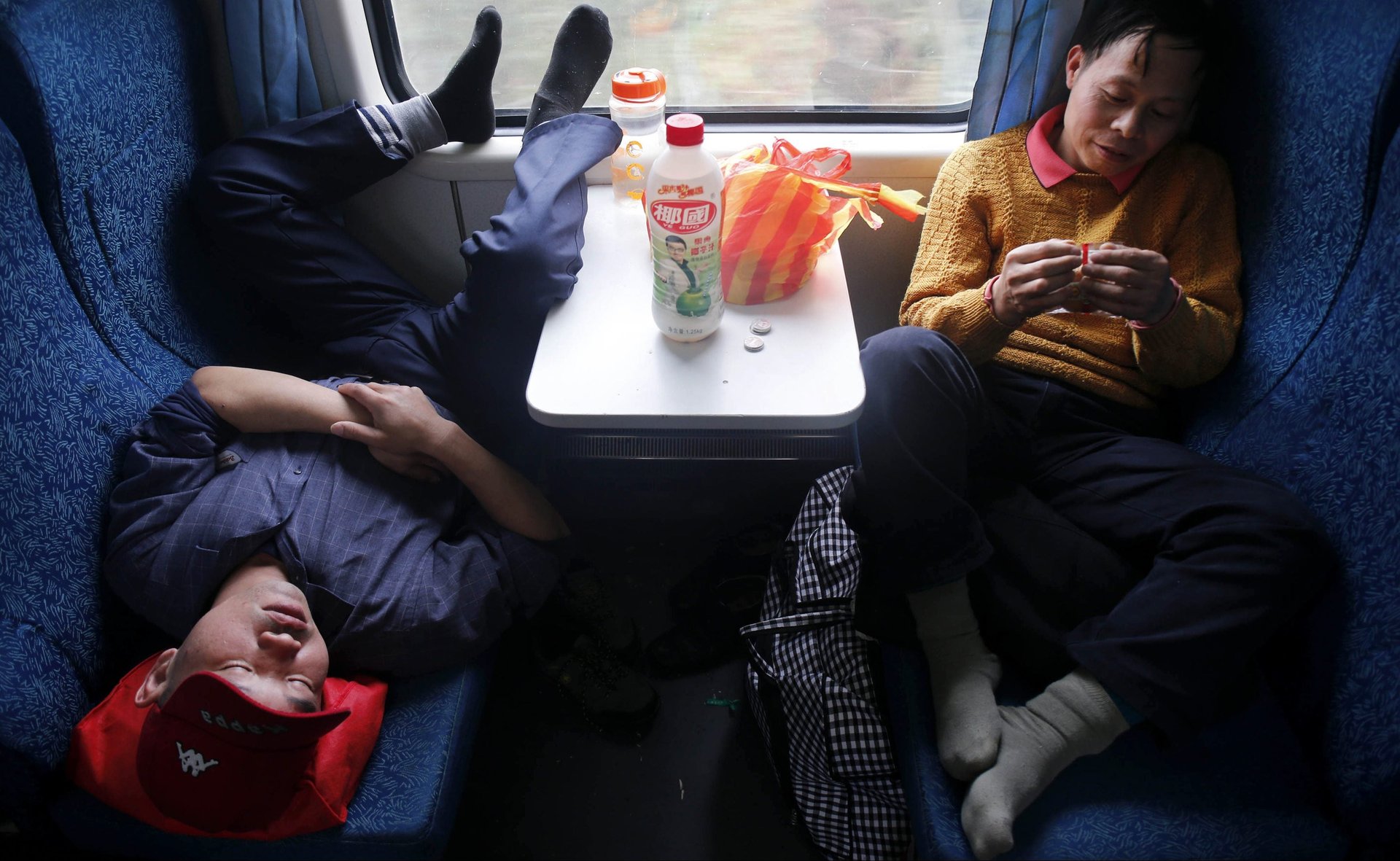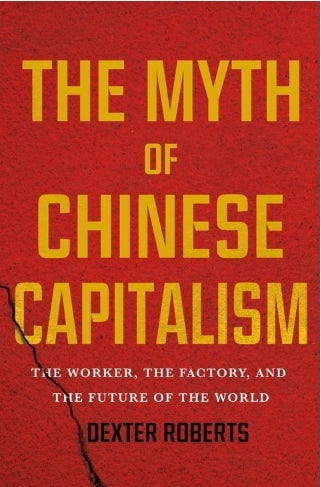Why China’s economic miracle is a myth made possible by exploitation of workers
We’ve all heard the story countless times: China’s three-decade-long economic miracle propelled it from being an isolated backwater to a global powerhouse and the second-largest economy in the world, and hundreds of millions of people have managed to escape poverty.


We’ve all heard the story countless times: China’s three-decade-long economic miracle propelled it from being an isolated backwater to a global powerhouse and the second-largest economy in the world, and hundreds of millions of people have managed to escape poverty.

What we’ve heard less about is the deeply unequal and exploitative system, centered around low-wage migrant workers from rural areas, that has fueled much of the country’s economic growth. These migrant workers, who make up almost half the national population, have been made second-class citizens and locked out of the huge economic windfall of China’s rapid development, argues writer and former China bureau chief of Bloomberg Businessweek Dexter Roberts. Roberts is now a fellow at the University of Montana’s Maureen and Mike Mansfield Center.
In his new book, The Myth of Chinese Capitalism: The Worker, the Factory, and the Future of the World, published by St. Martin’s Press, Roberts draws on his years of reporting in China to lay bare the systemic weaknesses of China’s economic system. Unless its government can address the profound inequalities that have made China’s economic miracle possible, he argues, the miracle will be nothing but an empty myth.
Below is an interview with the author, edited and condensed for clarity.
Quartz: The title of your book is The Myth of Chinese Capitalism. Could you sketch out what this myth is?
DR: In broad terms, the myth is that China is on a path towards a vastly expanded middle class at home, and overseas, it’ll be producing that cutting edge tech and the powerful companies that other multinationals fear and that they’ll be dominating markets abroad. The idea is that, fueled by economic growth, a much stronger and less brittle China is supposed to emerge. Another part of the myth says that China’s development path and authoritarian system could actually become a model for countries around the world. And the final point is that China can accomplish all these things while relegating half of its population to second-class status.
Why is it a myth, and when did you realize it was a myth?
I started doing pieces on the hukou household registration policy, the one-child policy, and the dual land system about five years ago. I started to realize at that point that these policies were not just human rights issues for China, but in some ways they were integral to the creation of China, and the last several decades of rapid economic growth. The household registration policy in particular basically ensured that that they had a relatively docile—although less and less so—but also low-paid work force to work in the factories and help China build this model of factory to the world.
The issue that [China is] facing now is that they no longer have cheap labor, they no longer have a docile labor force. Part of that has to do with the one-child policy, but it’s more than that. It’s a demographic challenge of an ageing population, an ageing workforce. They don’t have the cheap workers, and they are aware that they have a dangerously high overall debt level, around 300% of GDP. Many of these factories that have been part of this model have been heavily polluting, energy wasteful.
For all these reasons, [China] knows that they can’t actually continue with the old model. That’s why they’re trying to push away from this “factory to the world” model towards a much more domestic consumption driven economy, a service-driven economy.
The reality is that as long as they keep the household registration policy in place, as long as they make it very difficult for rural Chinese to actually benefit or monetize their land in the country side, they’re not going to have that new domestic market. If close to half the population is significantly poorer, they’re not going to be doing the spending that will help lift the Chinese economy.
The theme of the urban-rural divide plays out in other countries, too. What aspects of it are unique to China?
China is pretty unusual in that it still has, basically, this internal passport system, the hukou household registration system, that makes it very difficult for rural Chinese to actually settle in cities for reasons that are in the book. The fact is that rural Chinese can’t in general get access to affordable health care in cities, their children in general can’t go to the urban schools without paying a lot of money or they go to private schools that are often not as good. This is pretty unusual. There has been reforms, but it’s piecemeal and the general dimensions of the policy are still in place.
Similarly, with the land system, this fact that land in the countryside in theory belongs to the collective and therefore the farmers that actually till the land hold it—they are not, by and large, actually able to sell it. Or if they do they sell it at a very cheap price to local governments who then are able to re-define it as industrial or commercial land, and turn around and make a lot of money off it, but the farmers themselves can’t actually do that. By contrast, in the cities you’ve seen an explosion of wealth because… there are 70-year leases on the property in the city that will probably be extended. So there’s been this enormous and very, very lucrative real estate market for the urban people.
Another big issue in my book is the inequality in the education system. China is badly failing a lot of rural children when it comes to education. The drop-out rates for children in rural China are very high, higher than the government would admit. China’s not going to build a new high-tech innovation driven economy if a substantial portion of your population end up being high school drop-outs. It’s going to hold the country back badly if they continue to treat rural youth this way.
Many have for decades predicted the demise of the Chinese Communist regime, and yet it has just continued to solidify its grip on power. In your view, is the threat different this time?
I think absolutely there’s more of a threat now… the fact that by and large these jobs that have supported migrant workers are going away. There’s also a policy push from the highest levels of the government in Beijing to try to automate factories. And wages have gone way up. So there are a lot of other places that might be a better place for global supply chains to move.
So that’s sort of the big picture. You have millions of migrant workers who may no longer work in factories or construction sites who are supposed to re-invent themselves with a new form of employment. The service economy obviously is growing fast. A lot of the jobs in the service economy they’re taking are not the higher-paid jobs that Chinese policy makers were hoping for. So you have the phenomena of large numbers of migrant workers becoming delivery people on motorcycles, which frankly is a miserable job and is very dangerous with terrible rates of accidents. And then there’s the hope also that a large portion of them will go back to their villages and become entrepreneurs. It’s not clear how they can actually do that. Do they have the skills to do that?
I would argue there’s great uncertainty in the structural change that potentially does put much more stress on the system—the economic and political systems—than before. And then you have something like Covid-19, which is accelerating the diversification of the global supply chain. We had two years of the trade war that’s not over either, and now you have the coronavirus that’s pushing multinationals to look elsewhere. That’s putting further pressure on these jobs that have been a major source of employment for migrant workers. So I do think this is a time of heightened challenges for the economic system in China.
Looking at how China has handled the epidemic, what might it tell us about the trajectory of China’s development in the coming years?
One thing that’s clear is, I think it’ll intensify control efforts, whether it’s digital surveillance, or neighbors monitoring neighbors. These sorts of things have been used a lot during the coronavirus crisis and I’m afraid that the message that’s being taken by the senior leaders in Beijing is that control works, we need to clamp down even more, knowing where people move and what they say and who they meet.
I also sort of expect most urbanites in China to welcome the strengthened controls. I was in Beijing during SARS, and much to a lot of people’s surprise, after the initial bumbling of the SARS crisis then under Hu Jintao, they sort of got things together, they started monitoring people much more carefully. A couple months later, most urbanites in China were saying, look, the Communist Party is good, they pulled us out of that. I would not be surprised at all if you see something similar if indeed the coronavirus starts becoming more under control in China.
I don’t think that attitude of welcoming added control would be shared by the migrant workers. They’re under unprecedented stress right now, both in their lives and where they work. I think they’ll possibly come out feeling more resentful about the fact that they are treated as second-class citizens.
So the coronavirus crisis will widen the gulf between the urban and the rural populations?
Absolutely. I think it’s happening right now, I think it’s going to become even worse. It’s not as if these migrant workers didn’t know that they make, on average, a third of urban incomes. The migrants already know that. There’s lots of resentment that they’re treated differently in the system than urbanites. And I think the coronavirus and the way it unfolds for migrant workers in particular will only intensify that awareness of a gap that I think is correctly perceived to be unfair.
What will it take for China to shift gears to propel its next stage of economic development?
Part of what they’re doing is trying to improve pensions and health care for migrants, and education as well. But arguably the biggest and most effective thing they could do is start to reform and eventually do away with the household registration policy and the land system in the countryside. So far there’s been very little progress on that.
People in cities in most cases are not very welcoming to the migrants. Some of the protests we’ve seen in urban areas in recent years, a number of them have been directed against efforts by the Chinese government to allow more migrant kids to enter city schools. Unfortunately, there’s a lot of resistance from the people in cities as well.
Finally, the big picture is this movement toward more and more control. Actually, doing away with the household registration system, liberalizing the land so that farmers can actually profit from it, is a move away from control. And from everything I see happening within the party, and if you read the senior leaders and what Xi Jinping says, the message is not toward loosening control and certainly not in these areas. It’s a basic dilemma.